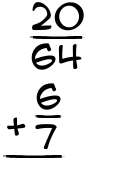What is 20/64 + 6/7?

|
This is how to add
|
|||||||||||||||||||||||||
Step 1We still have different denominators (bottom numbers), though, so we need to get a common denominator. This will make the bottom numbers match. Multiply the denominators together first. Now, multiply each numerator by the other term's denominator. Now we multiply 20 by 7, and get 140, then we multiply 64 by 7 and get 448. Now for the second term. You multiply 6 by 64, and get 384, then multiply 64 by 7 and get 448. This gives us a new problem that looks like so:
|
|||||||||||||||||||||||||
Step 2Since our denominators match, we can add the numerators. 140 + 384 = 524 That gives us an answer of
|
|||||||||||||||||||||||||
Step 3Can this fraction be reduced? First, we attempt to divide it by 2... Are both the numerator and the denominator evenly divisible by 2? Yes! So we reduce it:
Now, try the same number again. Are both the numerator and the denominator evenly divisible by 2? Yes! So we reduce it:
Now, try the same number again. Nope. Try the next prime number, 3... Nope. Try the next prime number, 5... Nope. Try the next prime number, 7... Nope. Try the next prime number, 11... Nope. Try the next prime number, 13... Nope. Try the next prime number, 17... Nope. Try the next prime number, 19... Nope. Try the next prime number, 23... Nope. Try the next prime number, 29... Nope. Try the next prime number, 31... Nope. Try the next prime number, 37... Nope. Try the next prime number, 41... Nope. Try the next prime number, 43... Nope. Try the next prime number, 47... Nope. Try the next prime number, 53... Nope. Try the next prime number, 59... Nope. Try the next prime number, 61... Nope. Try the next prime number, 67... Nope. Try the next prime number, 71... Nope. Try the next prime number, 73... Nope. Try the next prime number, 79... Nope. Try the next prime number, 83... Nope. Try the next prime number, 89... Nope. Try the next prime number, 97... Nope. Try the next prime number, 101... Nope. Try the next prime number, 103... Nope. Try the next prime number, 107... Nope. Try the next prime number, 109... Nope. Try the next prime number, 113... No good. 113 is larger than 112. So we're done reducing. Congratulations! Here's your final answer to 20/64 + 6/7
|